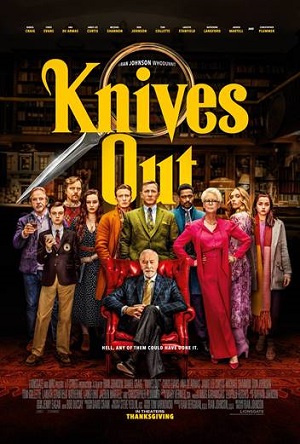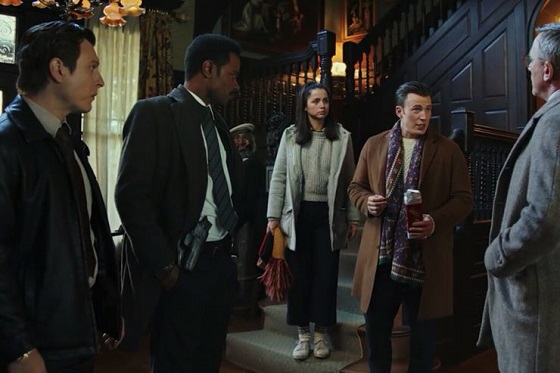

[Rating: Rock Fist Way Up]
A classic parlor mystery whodunnit with Agatha Christie sensibilities and the sheen of America’s 2019 sociopolitical landscape, Knives Out isn’t just coming to entertain, but to indict. Like his debut feature, Brick, director Rian Johnson is both reveling in as well as subverting classic genre tropes in Knives Out, using the mechanics of the murder mystery as the nourishing entrée while allowing for time and place-specific improvisations to dazzle as the side-dishes. This isn’t just for show, though. Aside from being a damn good time and a crackerjack mystery, the film deploys its genre deviations with surgical precision, both delighting its audience as well as forcing them to question their own values along the way.
The film doesn’t waste much time getting to the meat of things, with a housekeeper stumbling upon the corpse of her employer in his Victorian-style mansion as the opening credits fade in and out. The deceased is famed mystery novelist Harlan Thrombey (Christopher Plummer), who has died as a result of a slashed throat on his 85th birthday. Knives Out then jumps ahead one week, after Harlan’s funeral, as the Thrombey family gathers at the mansion in anticipation of the will reading. Yet before that can happen, the family members must go over the events leading up to Harlan’s death one more time with the authorities. The two local cops have already heard everyone’s story and are convinced Harlan’s death was a suicide, yet private investigator Benoit Blanc (Daniel Craig) hasn’t ruled anything or anyone out.
True to the genre, there’s a full stable of suspects, from Harlan’s alcoholic underachieving son, Walt (Michael Shannon), the over-the-hill Instagram influencer daughter, Joni (Toni Collette), the tough as nails oldest child, Linda (Jamie Lee Curtis), her pushy husband Richard (Don Johnson), their narcissistic adult son, Ransom (Chris Evans), and Harlan’s skittish nurse, Marta (Ana de Armas). As Blanc interviews each in turn, fragments of information tumble out and leave enough breadcrumbs to paint all of them as a suspect either by way of means or motive, much to Blanc’s growing fascination and amusement.

Rian Johnson wrote the script for Knives Out, and he’s clearly just as interested in giving his characters space to play as he is in peeling apart the layers of their mystery. Harlan’s wealth and how it will be distributed following his demise drives much of the behavior of the suspects, and besides being a path towards the hilarious at times, it is also informative. Money has insulated these people from any meaningful human contact over the years, and while they all feign different levels of grief over the family patriarch’s passing, their true motivations are hard to miss. This is nothing new in a story such as this (money driving nefarious doings), but Johnson does an interesting thing: he lets the audience in on all their secrets.
This is as far as this review will go in detailing specifics about the plot, but it should suffice to say that what makes Knives Out spectacular, riveting filmmaking isn’t just the mystery, but the informed route it takes toward peeling apart its many layers. In any other picture of this genre, revealing a person’s motivations or secrets might be the big “ah ha” moment, but in this movie, a more fully realized understanding of the characters and the world in which they live is what keeps everything moving towards the finish line.
This is 2019 America, after all: most rich people are heartless, hypocritical assholes, so saving that as a piece of the solution wouldn’t really work in Knives Out. For example, none of the family can seem to remember what country Marta is from, even though all of them seemed to want her at the funeral but were “out-voted” by the others (a pair of hilarious running jokes throughout the film). Each of the Thrombeys embraces their privilege to varying degrees, from the gleefully prickish Ransom (and holy shit, is Evans having a fun time with that) to the teenaged alt-right son of Walt, Jacob (Jaeden Martell), constantly glued to his phone in his never-ending lib-troll crusade. Even Marta, who seems to have her own secrets, isn’t immune to the poison this family spills out with every shudder, so that any time the audience seems to get a handle on what’s going on by way of a trusted character guide, they find their footing broken by yet another revelation.

All of the performances, large and small, are spectacular, but it is Craig as the southern-fried P.I. that steals the film, along with Armas’ Marta as his guide to all the family’s drama. The two actors are operating on different frequencies throughout the film, both in terms of their bearing and place in the narrative, yet they find a way to mesh seamlessly like some kind of sweet and sour delicacy. Don Johnson, Jamie Lee Curtis, Toni Collette, and Michael Shannon all get their moments as well, but it’s Craig and Armas that take Knives Out to the next level.
And what level is this? It’s a plane of cinematic existence where razor sharp writing meets world-class performances by A-list actors operating at the peak of their powers. It’s a place where a finely tuned genre exercise also acts as a primer for relevant social commentary. Knives Out is a lot of fun, but it also asks some very interesting questions, like whether it’s okay to be an asshole to assholes. Is it acceptable to be a little evil so that SUPER evil people don’t prosper, and how far down that line would you go before turning back due to your conscience? Rian Johnson’s tackles all of these questions and more with Knives Out, a movie so good that even internet trolls like Jacob (who likely hated The Last Jedi and made sure everyone knew it) can’t knock it down.





Comments on this entry are closed.